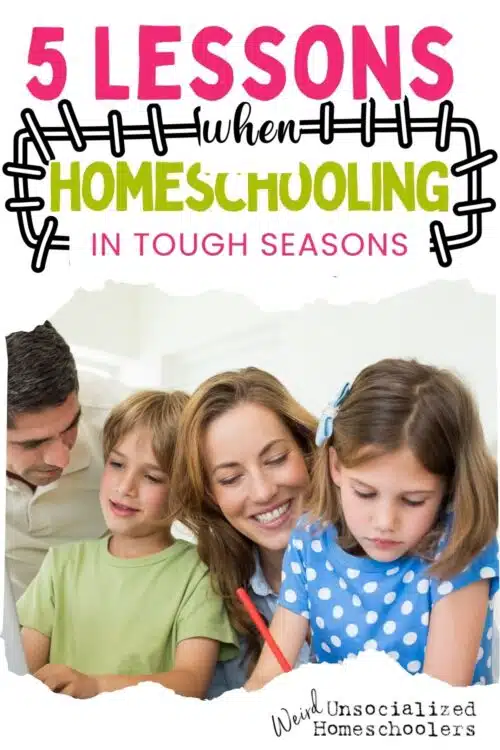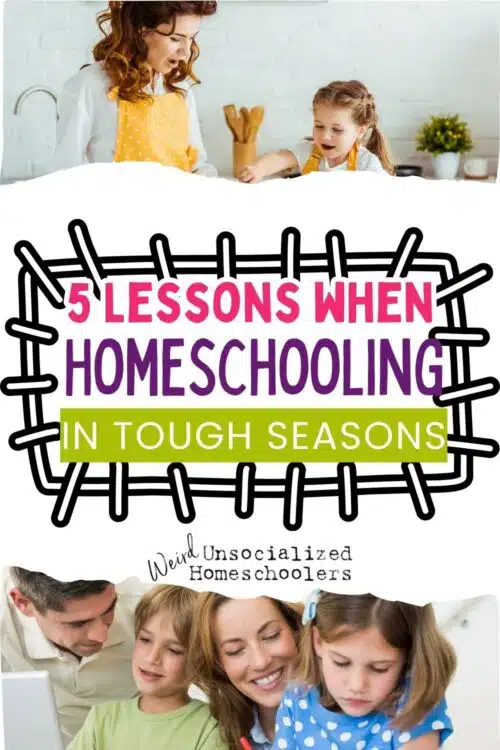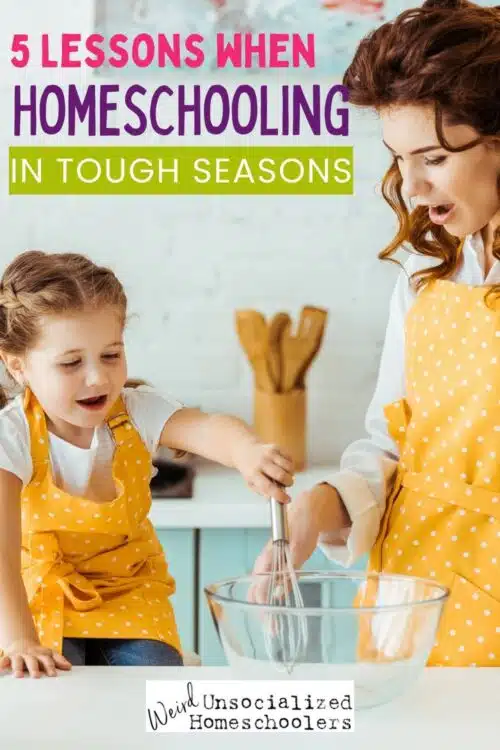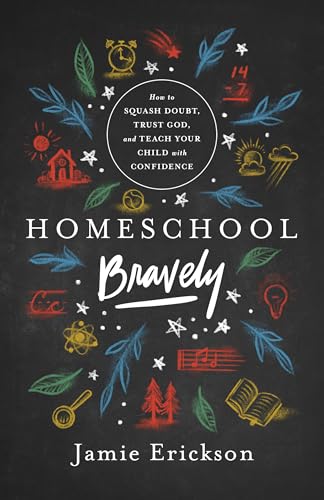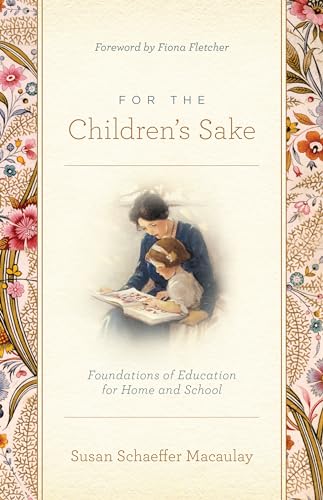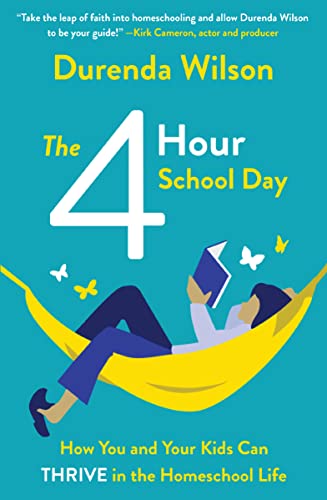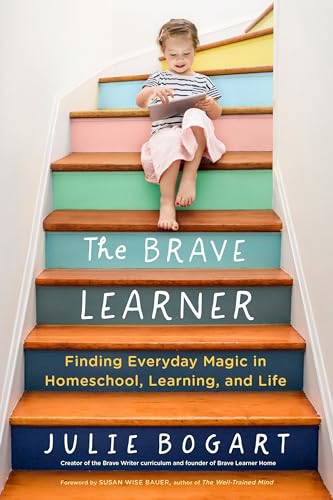5 Lessons for Homeschooling in Tough Seasons
This year my family, like many others, has faced an inexplicably relentless season of sickness. Just when we think we’re out of the woods, another random illness strikes. In the last six months, I think we’ve all been well for maybe a handful of days. This seems to be a common theme among families I’ve talked to this year, both locally and afar. This got me thinking about lessons for homeschooling in challenging seasons.
And while I don’t know what’s up with these health challenges from a medical standpoint, it has made me think about how hard seasons are always opportunities. They can be opportunities to be miserable and whine, or they can be opportunities to grow.
(In my case, admittedly, there has been some of both–in this and previous life seasons!) But most importantly, when it comes to lessons for homeschooling families, tough seasons are irreplaceable teaching opportunities.
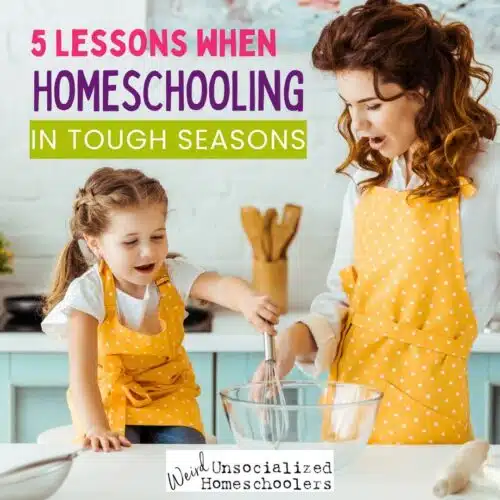
5 Lessons for Homeschooling in Challenging Times
Though we’d never choose a difficult situation over an easy one, and we are always grateful for peaceful days, tough seasons do give us the chance to share things with our kids that we might not, otherwise. Whether you’re dealing with mild illnesses on constant rotation like us, more severe health issues, a family crisis, or any constant disruption to your regular homeschool routine, here are 5 lessons to ponder and share with your family as you walk through life together.
1. Even Helpers Need Help Sometimes.
The following quote is from one of my favorites, Mr. Rogers, of Mr. Roger’s Neighborhood: “When I was a boy and I would see scary things in the news,” Rogers said, “my mother would say to me, ‘Look for the helpers. You will always find people who are helping.’”
Look for the helpers. You will always find people who are helping.
As homeschool moms, we often pride ourselves on our self-sufficiency and ability to nurture others. I’m willing to bet that a lot of us love to “be the helpers!” But the truth is that even the most industrious of us have time when we are just “surviving.” And yes, it’s hard to ask for help, especially when you see yourself as a strong, nurturing type.
That’s why one of the most important lessons for homeschooling moms is to have some kind of community that you can both pour into and draw out of– whether it’s family, friends, a church fellowship, or fellow homeschoolers. Even though we’d probably all like to be “superhero helpers” all the time, the truth is that even the helpers need help, sometimes.
Especially if you like to give to others regularly, it’s good for your kids to see that you are okay with graciously accepting help when you need it, too. Maybe this means happily accepting a meal someone brings you, or maybe it’s as simple as talking to someone you trust when you just need a listening ear.
Our kids need to know that the act of accepting–and being openly grateful for–help isn’t a sign of weakness. Rather, it shows the value of humility, gratitude, and the value of interconnectedness with others. Being part of a loving community means both giving and receiving help with grace. Giving to others is something we do out of love. It’s important to give of yourself as much as you can, but it’s good to be able to receive that love, too.
This is one of the most powerful lessons for homeschooling families, and one that I’ve started learning in the last year or so, and I hope that this–and the value of community–are lessons my kids learn as they grow.
2. Kids Can Be More Responsible Than They (or You) Realized
Last year, we experienced a different type of tough season–quite a common one! I had a pregnancy that became very difficult at the end, followed by several months of a non-sleeping newborn. Even though it was a season of love, it was an exhausting one, too.
Most homeschool moms know how this particular event can throw off the homeschooling groove! However, this tough season taught me and my (then) seven-year-old daughter something: even young kids can be very responsible when a need arises.
Everyone’s kids are different, and I realize that. My daughter is sweet and eager to please, but she does not respond well to anything unexpected. Unanticipated verbal directives can stir up a little rebellion in her. Like most kids, she responds better to structure. This is a little hilarious/unfortunate, given that her mother is a veritable ADHD chaos fairy. However, we found something that worked for us without requiring Martha-Stewart levels of organization: the simple checklist.
Every morning, I’d get her started with a handwritten checklist that included some school tasks, some chores, and some other fun (non-screen) activities like drawing, puzzles, etc. For the house chores, I gave her the opportunity to earn some change if she kept up with those checkmarks. This worked so well for her, and she was a huge help to me in addition to getting her schoolwork done each day.
Ultimately, I was amazed by how responsible and independent she could be, with just this little bit of structure and accountability. Talk about unexpected lessons for homeschooling moms … this ability of my child to grasp a new set of life skills was a surprise for me.
The level of independence my daughter had during these months only lasted a season because I like to be more involved at this age. However, it showed us both that she was capable of more responsibility than she’d had before. And we also learned what kind of simple structures work best to motivate her. I suspect she’ll be an effective listmaker and tackler her whole life long.
This lesson of independence and effective structures continues to benefit us at other tough times, like when sickness strikes.
3. How to Prioritize What Matters in Your Family
There is nothing like a tough season to whittle down your priorities. Whether money is tight or extra time is non-existent, all of life’s big challenges demand that we choose which things are important enough to receive our immediate attention. This is not a fun experience, but it can be an insightful one that reveals our values to us.
If you’re anything like me, sometimes your natural reaction to stress may be the opposite of prioritizing; being overwhelmed can make small issues look bigger than they are, resulting in general anxiety. Recognizing this tendency in myself has motivated me to be more intentional about establishing and modeling my priorities for my children. For example, some key family values I’m trying to prioritize are: being more present, doing something creative every day, and intentionally finding or making joyful moments.
I don’t think I’m mistaken in my belief that these are some of the most important lessons for homeschooling moms to grasp.
This shift in focus has been emphasized in our home and homeschooling journey. By prioritizing quality time and creative activities, we’re constantly finding more joy in the simple things. Making time for activities like painting or reading together shows my kids that these kinds of activities are healthy and important, in more ways than one.
I hope that, as I intentionally keep my priorities in mind, I’ll also pass along these values to my children. As I learn to better balance life’s demands with its joys in other hard seasons, I know that much of what I’m learning is shaping the structure of our home and homeschool. My hope is that this has a lasting impact–that it instills lessons and values that my children will keep with them always.
4. Flexibility, Perseverance and Teamwork Make the Dream Work.
Most homeschoolers are already pretty good at being flexible. This is one of those lessons for homeschooling that comes naturally to us. After all, many of us parents were drawn to this lifestyle because it allows for flexibility, and this may be a strong component of our home lives. This becomes both an asset and something to continue to develop when we’re in more difficult seasons. When hard things happen, we can teach our kids to value the ability to be flexible and adaptable in the face of challenges or lifestyle changes–to think of it as a super-strength.
Many kids in public or private schools have changes thrust upon them when difficult situations happen. A lot of things are decided for them, and they don’t get to be active participants in those decisions. Homeschoolers, in contrast, are a part of family life 24/7 and can be an active part of necessary changes.
For example, let’s say that mom is the primary homeschool parent, but she needs to start working outside of the home. There would likely be changes for everyone in the family. Homeschooled kids will be an active part of those changes as the homeschool schedule shifts, as they learn to be more independent with school when mom is at work, etc. They may also have adaptability in the family unit modeled for them with mom taking on a new schedule, and if dad decides to take on more homeschooling or more household tasks.
All these changes require flexibility. Home changes like this, or other challenging situations, can also be used to show and tell kids, “You can do hard things!” Kids can learn through success that they have the power to help the family by being flexible, that they can persevere in the face of challenges, and that the family can work together to work things out.
The way that homeschoolers are “right in the action” when there are difficult situations has the potential to be among the greatest lessons for homeschooling families in the areas of teamwork and adaptability. This is valuable preparation for life, which constantly demands our flexibility, perseverance, and our ability to work in a team.
5. Remember to Count Your Blessings
Please don’t read this in a petty or patronizing tone. I realize it sounds like something you’d read on the wrapper of a Dove chocolate or hear from an acquaintance who doesn’t really care what’s going on with you. I don’t mean it that way!
What I mean is this: you set the tone of your home, and counting your blessings is a great way to set a joyful, peaceful tone instead of a constantly worried one. You can’t stop difficult things from coming, but you can choose to be grateful in the face of them!
It is so easy (and I speak from personal experience) to give in to negative thoughts and perceptions. Did you know negative thinking is addictive? For one thing, your brain becomes comfortable with frequent thought pathways (whatever they are). Additionally, the brain’s response to stress can activate dopamine pathways. Since your brain loves dopamine, it’s like a little treat at the end of every scary thought you have. Yes, your brain is basically a drama queen.
I have caught myself falling into that pattern many times in the past. It’s easy to do, and you have to be really mindful about stopping it. I just know that I would rather be grateful for the many blessings I do have, instead of being stressed over the constant stream of things I could choose to be stressed over.
And I know that I want my children to be the kind of people who have grateful hearts, who are quick to smile and encourage others, and who count their blessings. But I must model that first! My hope, for myself and for you, is that we can work towards breaking those negative thought patterns and try to find gratitude in each day that we are given. This is one of the best lessons I can think of to pass along to the future generation (homeschooled or not!)
Closing Thoughts on Lessons for Homeschooling in Challenging Seasons
I hope that these 5 lessons for homeschooling in tough seasons bring you comfort and peace in your home now and in future seasons to come. One of the most powerful–and challenging–things about homeschooling is the way it allows us to teach through life. Our kids learn not just by what we teach, but also by how we live. It’s a big challenge, but we are here for it, right?
I also love that homeschooling allows us to work as a family team and gives kids more opportunities to participate and serve in life’s various seasons.
I’m curious to hear about your experiences, too. What challenging season has your family navigated? And what lessons for homeschooling families would you like to share with others? What did you learn that brought about changes in your home and homeschooling approach?
Katie Gustafson has been a member of the world of “weird, unsocialized homeschoolers” for a long time–first as an alumnus and now as a homeschooling mom to a fiercely fun little girl! She’s very into anything creative, especially writing, dancing, and painting. She’s also particularly passionate about literature and owns more books than she will probably ever be able to read. However, she reassures herself with the belief that, in the event of a digital apocalypse, she’s cultivating a much-needed physical library for future generations. Katie is happy to contribute articles to Weird Unsocialized Homeschoolers, Hip Homeschool Moms and Sparketh. She also has a personal blog on writewhereuare.com.




